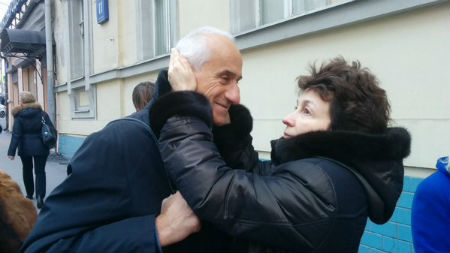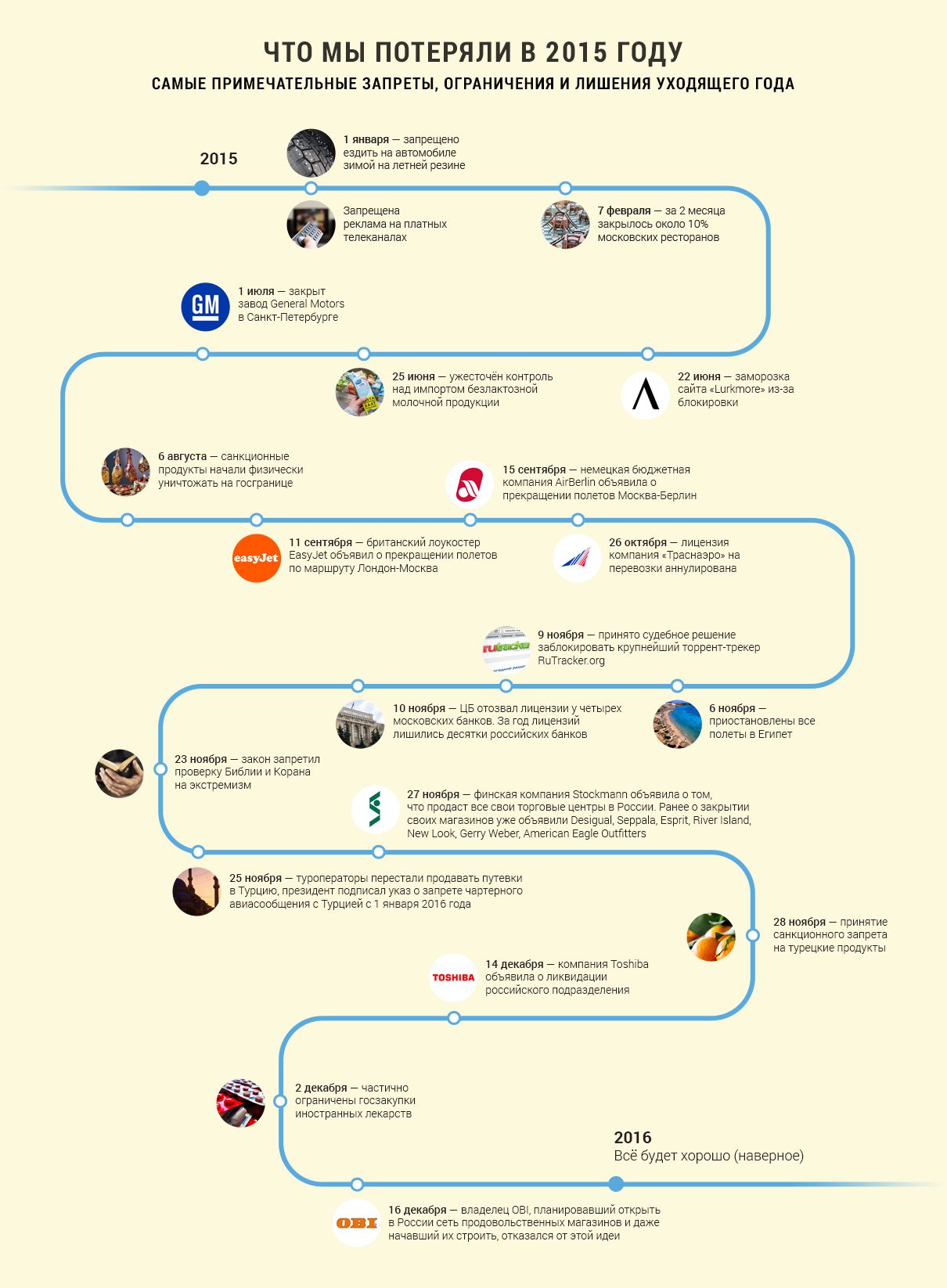Welcome to our column, Russia Update, where we will be closely following day-to-day developments in Russia, including the Russian government’s foreign and domestic policies.
The previous issue is here.
Recent Translations:
–The Non-Hybrid War
–Kashin Explains His ‘Letter to Leaders’ on ‘Fontanka Office’
–TV Rain Interviews Volunteer Fighter Back from Donbass
–‘I Was on Active Duty’: Interview with Captured GRU Officer Aleksandrov
UPDATES BELOW
The Moscow city news site Yodnews.ru published a chart today titled “What We Lost in 2015: The Most Notable Bans, Restrictions and Losses of the Past Year.”
The dramatic events that caused these losses were Russia’s annexation of Crimea and the invasion of the Donbass, which triggered Western sanctions; counter-boycotts by Russia of European food; further restriction on media and Internet freedoms as the Kremlin grew more hostile to the outside world; the likely terrorist bombing of Russia’s Metrojet plane traveling from Egypt to St. Petersburg; and Turkey’s shooting down of a Russian fighter plane that strayed into its airspace near the Syrian border. All of these and related events had consequences for ordinary consumers — less food, higher prices, the end of budget travel to Europe, and closed Internet sites.
The chart has been translated by The Interpreter:
To this list we could add the numerous McDonald’s franchises temporarily closed in Russia for “inspection”; the Spanish fashion store Zara, Wendy’s, the Gap, Esprit, and the British store River Island, which have also closed stores or left Russia entirely.
The exception is IKEA, the Swedish store which is the world’s largest furniture retailer. IKEA closed a “lifestyle” section of its Russian website to avoid crossing Russia’s anti-gay laws and plans to invest $3 billion in the next 5 years in Russia, where sales have increased as other retailers have left.
The European Union has extended economic sanctions against Russia by six months, with the current sanctions regime now due to stay in place until July 31, 2016.
A statement, published today on the website of the European Council, says that the sanctions are being extended due to the failure to implement all of the Minsk agreements by December 31:
On 22 June 2015, the Council prolonged the duration of the measures by six months until 31 January 2016. This followed an agreement in the European Council in March 2015, when EU leaders linked the duration of the sanctions to the complete implementation of the Minsk agreements, which was foreseen to take place by 31 December 2015.
However, since the Minsk agreements will not be fully implemented by 31 December 2015, the duration of the sanctions has been prolonged whilst the Council continues its assessment of progress in implementation.
Earlier this month Italian diplomats called for a debate on the extension of sanctions, preventing their automatic renewal:
However on December 18, European diplomats agreed to extend the sanctions at a meeting of all 28 member states’ ambassadors to the EU.
— Pierre Vaux
Grani.ru reports that 76-year-old Vladimir Ionov, a regular protester in Moscow who was under prosecution by the Russian authorities for conducting repeated, unsanctioned protests, has fled to Ukraine.
Last month prosecutors requested that Ionov receive a three-year suspended sentence, with sentencing due on December 8.
This was despite the fact that Ionov had usually conducted solo pickets, standing alone with placards, which would not be illegal even under the draconian anti-protest legislation introduced in July, 2014.
However as Halya Coynash of the Kharkiv Human Rights Protection Group explains, the authorities regularly use provocateurs to qualify these solo protests as illegal group demonstrations:
Of particular concern here is the way the ‘offences’ are effectively manufactured. Both Ionov and Galperin are accused over single-person pickets which do not require authorization. A standard form of provocation is to have someone go up to the picketers, and refuse to go away. The police immediately turn up and detain both (the provocateur only nominally) for ‘holding an unsanctioned meeting’.
Ionov’s sentencing was deferred until December 23 after he was hospitalised with heart issues on December 7.
Under the terms imposed by the court on November 25, Ionov was barred from leaving Moscow or attending public events.
Having been stripped of his passport, Ionov was forced to enter Ukraine illegally, passing through vegetable gardens on the border, before travelling by car to Kharkiv with his partner, Olga Braun, who had previously legally travelled to Ukraine.

Vladimir Ionov and Olga Braun. Photo: Yuri Timofeyev/Grani.ru
Ionov said:
“I don’t think that I have left forever. My motherland is Russia, and I think that there will soon be serious changes here. God grant that these changes take place without bloodshed.”
— Pierre Vaux
After the meeting, unknown assailants attacked him (translation by The Interpreter):
“Of course the negotiations with the movie theater seemed completely safe to me, I didn’t imagine that something could threaten Artyom. On Thursday, December 17, Artyom was supposed to head off to this fateful meeting with the theater director. On Friday Artyom called from another number and told me what had happened. The movie theater director had told him that he didn’t know if he would be able to rent the hall and proposed calling another day. Artyom came out of the movie theater after 9:00 am and 10 minutes later the attack on him was made.
On Sovetskaya Street, two unknown men attacked him, dealing several blows with a piece of reinforced concrete, after which they continued to kick him and take away his cell phone. They didn’t take anything more, therefore a motive of ordinary robbery seems unlikely.
Evidently, Artyom was attacked due to his attempts to make an agreement with the movie theater, and the telephone was seized in order to determine his contacts and find out on at whose request he had done this. Immediately after the conversation with Artyom, I called the same Druzhba movie theater and asked if we could rent the hall for a private showing. The phone was handed to the director who immediately refused me.
At this time Artyom has left Kushchevskaya since he fears for his life. He decided not to go to the police because there is no trust in the law-enforcement agencies here. The Kushchevskaya story in Krasnodar Territory never ended. But Artyom still videotaped his bruises. Now five people have the video interview of Artyom where he describes what happened to him and his bruises are filmed. In the event that a car “accidentally” runs over me or a brick falls on my head or something like that, these materials can be sent to the media, Investigative Committee and FSB. With this post I appeal to those involved in the attack on Artyom: I really hope that in reading this text you will understand that Artyom wound up involved in this story accidentally, he’s not related to the Anti-Corruption Fund and the opposition. I hope you will leave him alone.”
Martynenko then told RBC that doctors had diagnosed internal trauma and numerous soft-tissue injures, but then he broke off any further contact with reporters.
Sergei Isyuk, director of the Druzhba movie theater denies that anyone came to meet him, although he said that he had received a phone all about renting the hall privately and he had replied that the theater didn’t have that capacity. He believe that Mandrigel had fabricated the story “from start to finish.”
Readers of Mandrigel’s Facebook post also expressed doubt about the beating because the video tape was not uploaded for public view. Martynenko himself did not provide details about whom he had met; Mandrigel said he had been reluctant to talk about the attack at all at first then decided it could be publicized.
The Investigative Committee will determine whether a satirical tweet made by opposition leader Alexey Navalny with an attached historical painting was libelous regarding the judge in the Kirovles case, TASS reported.
The suit was set in motion by an inquiry from Antaoly Vyborny, a State Duma member from United Russia, to the Investigative Committee, asking for an investigation into whether Navalny’s statement about Judge Yevgeny Borisov of the Nikulinsky District Court at the time qualified as libel or not.
Translation: 16,165,826 ruble damages levied.
In his blog post linked to the tweet, Navalny adapted the painting to comment on his own case in a trial widely believed to be fabricated in retaliation for his anti-corruption activism.
The prosecution of the Kirovles case, involving a load of lumber purchased for 14.5 million and sold for over 16 million was already shaky but became doubly unfair when the judge applied damages to Navalny involving a 14.7 million ruble payment already made to Kirovoles and not returned.
Navalny was unapologetic and tweeted another sarcastic remark:
Translation: It’s not true: no one has flayed the skin from this corrupt judge yet.
This latest round of legal action against Navalny in an attempt to silence his anti-corruption work follows from the October ruling and has its own dynamic, But authorities may have decided not to let the claims drop because they are now motivated to retaliate from Navalny’s December 1 video and report charging the Prosecutor General of Russia Yury Chaika and his sons with corrupt dealings.
— Catherine A. Fitzpatrick
